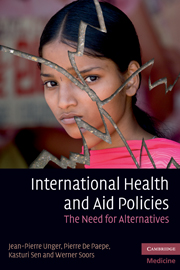Book contents
- Frontmatter
- Contents
- Preface
- Biographies
- Notices
- Acknowledgements
- List of abbreviations
- Reviews
- Introduction: Overview and purpose
- Section 1 Paradigms of international policies
- Section 2 The failure of the aid paradigm: poor disease control in developing countries
- Section 3 Impact of international health policies on access to health in middle-income countries: some experiences from Latin America
- Section 4 Determinants and implications of new liberal health policies: the case of India, China and Lebanon
- Section 5 Principles for alternative, publicly oriented health care policies, planning, management and delivery
- Section 6 A public health, strategic toolkit to implement these alternatives
- Conclusions
- Glossary
- Index
- References
Conclusions
Published online by Cambridge University Press: 06 December 2010
- Frontmatter
- Contents
- Preface
- Biographies
- Notices
- Acknowledgements
- List of abbreviations
- Reviews
- Introduction: Overview and purpose
- Section 1 Paradigms of international policies
- Section 2 The failure of the aid paradigm: poor disease control in developing countries
- Section 3 Impact of international health policies on access to health in middle-income countries: some experiences from Latin America
- Section 4 Determinants and implications of new liberal health policies: the case of India, China and Lebanon
- Section 5 Principles for alternative, publicly oriented health care policies, planning, management and delivery
- Section 6 A public health, strategic toolkit to implement these alternatives
- Conclusions
- Glossary
- Index
- References
Summary
A failure at large
International health and aid policies share a large responsibility for the breakdown of the health systems of many LMICs. The fact that two decades of neoliberal policy systematically undermined access to quality health care services for a majority of the world population receives insufficient attention. The consequences in terms of avoidable suffering, ill health, debt, poverty, and death are largely overlooked.
Consider avoidable death attributable to MDG-related conditions, representing only a fraction of premature mortality:
More than 530,000 women die of conditions linked to pregnancy every year (World Health Organization, 2007b);
Pneumonia and diarrhoea still kill 3.8 million children under five each year;
2 million people died of AIDS in 2007 (UNAIDS, 2008);
1.6 million people died of tuberculosis in 2005 (World Health Organization, 2007a);
Between 700,000 and 900,000 children die of malaria in Africa every year.
Overall, avoidable suffering is responsible for 9.3 million deaths every year, an amount close to the yearly death toll of World War II. Arguably, we face a need for a policy shift that re-establishes the right to access quality health care. Such a policy shift would have a positive impact on a broad array of suffering, including and beyond ill health and death (Yamin, 2008).
Consider migration as an example. While HICs oppose human trafficking (U.S. Department of State, 2008) (for human rights reasons) and illegal migration (of unqualified workers and their families), they fail to support policies to improve living conditions in LMICs.
- Type
- Chapter
- Information
- International Health and Aid PoliciesThe Need for Alternatives, pp. 247 - 254Publisher: Cambridge University PressPrint publication year: 2010



